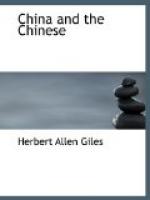Headboroughs, government of Chinese boroughs, 77-78.
“Heavenly horse,” origin of, 131, 133.
Hebrews in China, 144.
“Henpecked husbands,” 204.
Historical Record—
Alchemy, 166.
Sketch of contents, 45-47.
History—
B.C., 130.
Book of History, Confucian
Canon, 41.
Dynastic histories, see
that title.
Mirror of History,
49.
Holland—story of Dutch settlement in China, 137.
“Horse-money,” Chinese doctors’ fees, 209.
Horses—
“Heavenly horse,”
131, 133.
Official coats, “horse-shoe
sleeves,” 179.
Respect for, origin of queue,
179.
House, Chinese, Greek characteristics, 120-121.
Hsue Shen dictionary, 63-64.
Huai-nan, Prince of—
Discovery of elixir of life,
168.
Taoist writings, 149.
Husbands, “henpecked,” 204.
Immortality, Taoist doctrine—
Elixir of life, 163-170.
Memorial of aggrieved Confucianist,
170.
Pills of immortality concocted,
effect of, 167.
Imperial Library catalogue, 69-70.
Imperial statutes, present Chinese dynasty, 56.
Inaction, doctrine of, Lao Tzu’s philosophy, 152, 156.
Infanticide—
Baby Towers, 190-192.
Bird-Bishop, Mrs., statement
of, 192,193.
Chinese exaggeration, 192-193.
Cumming, Miss G., writings
of, 189-192.
Drowning children in pools,
192-193.
Jesuit writings, illustrations,
192.
Market value of girls, 195.
Negative argument, 193-195.
[See also Children.]
Intendant of circuit, official, 76, 83.
Invitation to dinner, 188.
Ivory carvings, Greek and Chinese, 124-125.
Japan—
Dress, misconception as to,
178.
Language, absence of terms
of abuse, 124.
Jebb, Sir K., influence of the classics
in mental training, case of
Lord Granville, 109-113.
Jesuits in China—
Infanticide illustrations
in writings, 192.
Music of Greeks borrowed from
Chinese, alleged, 129.
Translation of Chinese character
into “ark,” 34.
Jews in China, 144.
Jugglers, Chinese and Grecian, 124.
Justice—
Administration of, 102-104.
Commissioner of, 81.
K’ang Hsi, Emperor—
Dictionary and phrase-concordance
ordered, 64, 65.
Foot-binding prohibited by,
203.
Kiangsu riot, 99.
Language, Chinese—
Colloquial—
Coupling of words,
20.
Dialects, number
and distinction of, 6-10.
Lack of vocables,
17-21.
Mandarin, see
that title.
Monosyllables,
incapable of inflection, 10-17.
Rhyme, 67-68.




